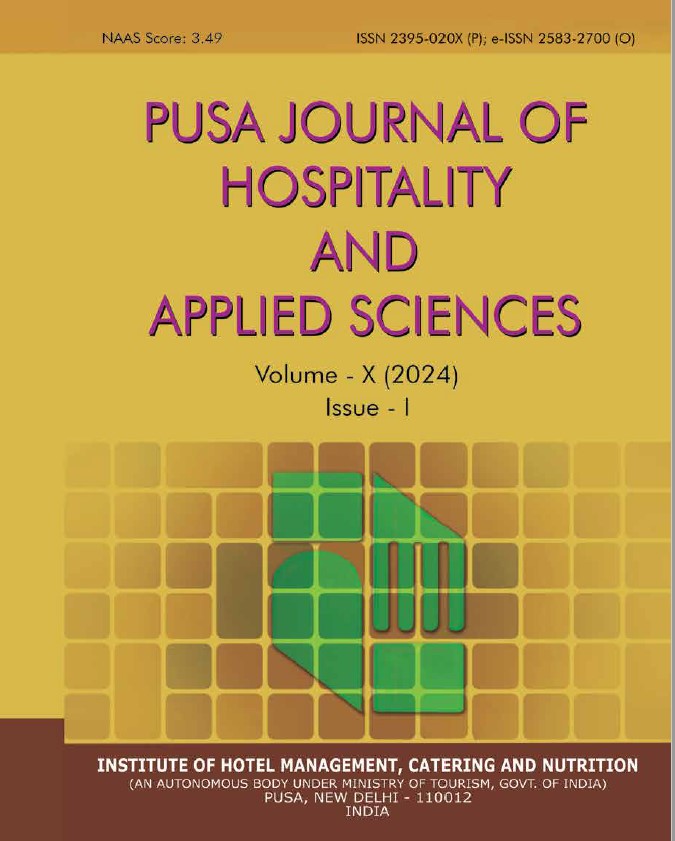A Study On Assessment Of Environmental Practices And Awareness Level Of Hospitality Students Generated By Tras Program#
Keywords:
Awareness Level, Sustainable Development, Environment, Competition, StudentsAbstract
Background: Major issues relating to environmental pollution and depletion of valuable natural resources vary in dimension from local, regional to global levels. Taking small steps of environmental practices at primary level will help us to make a bigger change in global level. With the pellucid help of government bodies and NGOs, we can create awareness programme involving participation of common person. The study deals with Think Responsible Act Sustainable (TRAS) campaign by IHM Pusa under LEADearthSHIP (a collaboration of TERI and Genpact) to increase the awareness level of students towards green practices for a sustainable future.Objective:1.To find out the awareness level of Green Initiatives taken by college among the Students.2.To examine the difference in knowledge and awareness on sustainable activities of students after LEADearthSHIP implementation. Methodology: In this study, quantitative research method was used and research data was collected by online questionnaire technique. The sample comprised of 300 students of IHM PUSA, New Delhi. Results: The subjects had an admirable awareness level of the sustainable programmes running in the college. Conclusion: The competition like LEADearthSHIP among colleges helps the students to increases the knowledge, skill and attitude towards the environment. The current generation is now aware of the fact that it is appropriate time to study and execute various practices that can lead to a sustainable environment.
References
Butlin, J. (1987). Our common future. By World commission on environmental and development, Journal of International Development, London, Oxford University Press.
http//www.teriin.org
http//www.genpact.com
Khan S.H. (2013). A Study of Attitude Towards Environmental Awareness In Relation to Certain Variables Among Senior Secondary School Students.
Kumar and Saha. (2010). An Assessment of Eco-club in few Schools of Burdwan Town, West Bengal, India, Anwesa, Vol. 5:PP. 85 – 93.
Sengupta et.al. (2010). Environmental Awareness and Environment Related Behaviour of Twelfth Grade Students in Kolkata: Effects of Stream and Gender; 2010, Anwesa, Vol. 5:PP. 1 – 8. 7. Sivamoorthy et.al. (2013). Environmental Awareness and Practices among College Students International Journal of Humanities and Social Science Invention www.ijhssi.org Volume 2 Issue 8:PP.11-15. 8. Sunaravalli T.(2012). Student Teachers‟ awareness on environmental pollution, International Journal of Teacher Educational Research.
www.Ecology.edu/environmentaleducation.html(retrieved on 13 September 2016). 10. www.wwfindia.org/?11982/MC-Mehta-vs-University-Grants-Commission-Ors (retrieved on 13 September 2016).
www.indiaenvironmentalportal.org.in/content/396669/jugement-of-the-nationalgreen-tribunal-on-the issue-of-supreme-court-directive-for-providing-compulsoryenvironmental-education-to-the-students of-schools-and-colleges-throughout-thecountry-17072014/ (retrieved on 13 September 2016).
www.timesofindia.com/ciy/lucknow/TOIs-Green-campaign-attracts-100-ideas-fromacross-UP/ articleshow/52196696.cms (retrieved on 13 September 2016).
www.delhi.gov.in/wps/wcm/connect/Environment/environment/plan+schemes/eco+cl ubs+in+schools+and+colleges/plan+schemes/eco+clubs+in+schools+and+colleges (retrieved on 13 September 2016).




